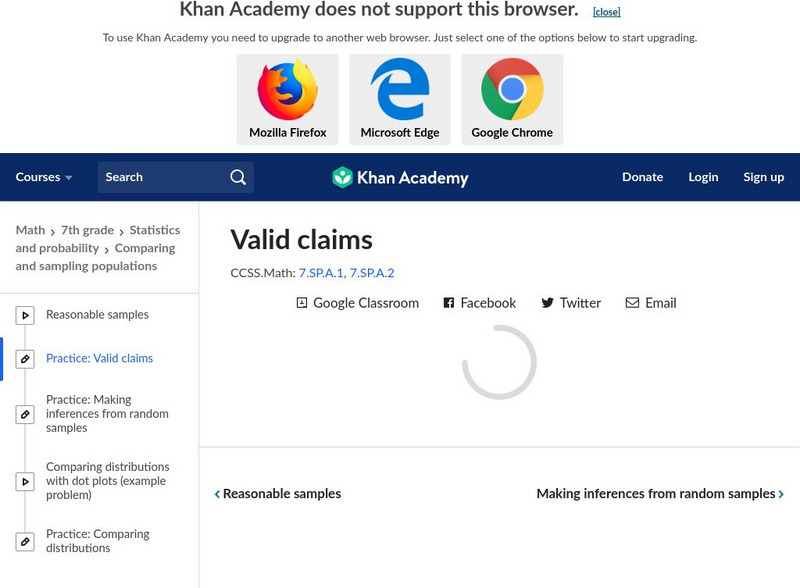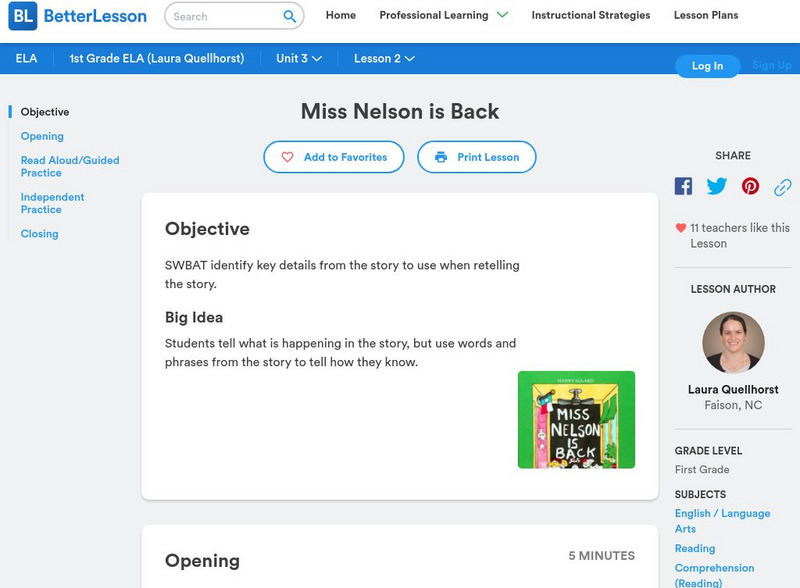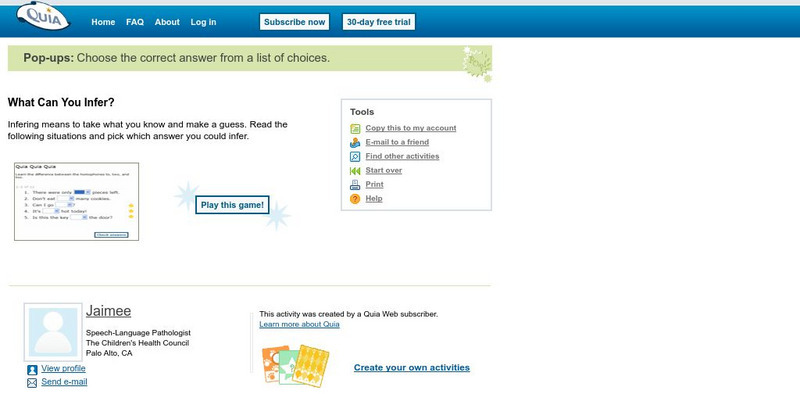CK-12 Foundation
Ck 12: Statistics: Sampling Distributions
[Free Registration/Login may be required to access all resource tools.] This concept introduces the sampling distribution of the mean, inferring the population mean from samples and sampling error.
Florida Center for Reading Research
Florida Center for Reading Research: Text Analysis: Incredible Inferences [Pdf]
A lesson plan in which students play a game to cover words on a game board by making inferences. Materials are included.
Florida Center for Reading Research
Florida Center for Reading Research: Text Analysis: Incredible Inferences [Pdf]
A lesson plan in which students play a game by covering places on a board while making inferences. Materials are included.
Read Works
Read Works: Grade 1: Three Lesson Unit: Character: Actions, Feelings, Looks
[Free Registration/Login Required] A series of three lesson plans, based on David Shannon's books No, David!, David Gets in Trouble, and David Goes to School. Students learn how to utilize text and picture clues to determine and describe...
BBC
Bbc Skillswise: Reading and Understanding
Tips on how to check understanding of text for adult learnings.
Alabama Learning Exchange
Alex: Franklin D. Roosevelt's Pearl Harbor Address
The viewing goals for this lesson were for students to use a visual text, Franklin D. Roosevelt's "Day of Infamy" speech (played first without sound), to identify visual cues & understand why he may have chosen to use certain...
Better Lesson
Better Lesson: Miss Nelson Is Back
First graders tell what is happening in the story, but use words and phrases from the story to tell how they know.
Better Lesson
Better Lesson: Introduction to Making Predictions and Inferences
First graders will engage in a shared reading of "Mr. C's Dinner" so that we can build a foundation for understanding what it takes to make good predictions and inferences.
Better Lesson
Better Lesson: Using Word and Picture Clues to Make an Inference
First graders will use text evidence to make inferences about word and word phrase meanings in a text. Word and picture clues will be used to help students form inferences.
Other
Freedom on the Move: Telling Their Stories
The "Telling Their Stories" lesson plan guides students through the era of enslavement through the lens of those who chose to flee as a form of resistance. Using the Freedom on the Move database of runaway ads, this lesson centers on the...
Khan Academy
Khan Academy: Strongly Supported Inferences Quick Guide
A quick guide to approaching questions that ask you to identify something that is "strongly supported." On questions that ask you to find the choice that is most strongly supported by a stimulus, the answer does not have to be...
Khan Academy
Khan Academy: Strongly Supported Inferences Learn More
How do we recognize what is "strongly supported?" Some questions on the logical reasoning section of the LSAT ask what additional information is supported by a stimulus. These are similar to questions that ask you to identify the...
Khan Academy
Khan Academy: Inferences About Information Quick Guide
Some questions in the Reading Comprehension section will ask you to make an inference about information in the passage. The answer may not be explicitly stated in the passage, but it will be supported by the content of the passage. In...
Louisiana Department of Education
Louisiana Doe: Louisiana Believes: Eureka Math Parent Guide: Statistics and Probability
A guide to support parents as they work with their students in statistics and probability.
McGraw Hill
Read: Does Technology Make Us Lazy?
Compare these two passages for some interesting ideas about how technology affects our lives. The questions that follow ask you to identify the main idea from either direct statement or inference.
Ted Nellen
Cyber English (By Ted Nellen): Literary Terms F R
The second of three pages of simple definitions for literary terms. This page, F - R, covers forty-seven terms from "Fable," to "Romance."
Annenberg Foundation
Annenberg Learner: Journey North: Reading Strategies: Make Inferences and Draw Conclusions
Learn how to go beyond the literal meaning of a text by using a list of guiding questions to make inferences and draw conclusions.
Quia
Quia: 5th Grade Drawing Conclusions
Read a short text and then choose an appropriate inference or conclusion in this five-question quiz.
Quia
Quia: What Can You Infer?
Choose the correct inference for each statement in this fifteen-question quiz.
Quia
Quia: What Can You Infer #2
Read each short text and make an inference in this twelve-question quiz.
Quia
Quia: Inferencing Millionaire
Read a short text and then choose the correct inference or in this Rags to Riches style game.
Quia
Quia: Inferences Rags to Riches
Read a short text and then choose the correct inference in this Rags to Riches style game.
Quia
Quia: 7th Grade Making Inferences 2013
Read a short text and then choose the correct inference in this Rags to Riches learning game.




![Florida Center for Reading Research: Text Analysis: Incredible Inferences [Pdf] Lesson Plan Florida Center for Reading Research: Text Analysis: Incredible Inferences [Pdf] Lesson Plan](https://content.lessonplanet.com/knovation/original/509092-1f8464bfd22060486a7ced8fa8c4310e.jpg?1661786985)
![Florida Center for Reading Research: Text Analysis: Incredible Inferences [Pdf] Lesson Plan Florida Center for Reading Research: Text Analysis: Incredible Inferences [Pdf] Lesson Plan](https://content.lessonplanet.com/knovation/original/509101-bb8c554899d4d9c53e422b2a416a2b4c.jpg?1661786972)


















